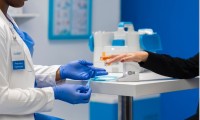-
Boehringer Ingelheim Strikes Regenerative Med R&D Deal Spanning MASH & More Liver Diseases
- Source: drugdu
- 87
- April 24, 2024
-
Low-Cost Point-Of-Care Diagnostic to Expand Access to STI Testing
- Source: drugdu
- 81
- April 23, 2024
-
AI Tool Precisely Matches Cancer Drugs to Patients Using Information from Each Tumor Cell
- Source: drugdu
- 119
- April 23, 2024
-
Boston Scientific recalls blood-blocking agent linked to 2 deaths
- Source: drugdu
- 123
- April 22, 2024
-
Weekly insulin analogues approaching approval could herald change
- Source: drugdu
- 104
- April 22, 2024
-
Unique Hand-Warming Technology Supports High-Quality Fingertip Blood Sample Collection
- Source: drugdu
- 121
- April 20, 2024
-
Glenmark recalls 6,528 bottles of BP drug in US
- Source: drugdu
- 113
- April 20, 2024
-
GlobalData
- Source: drugdu
- 119
- April 20, 2024
-
Chemomab touts study confirming CCL24 link to systemic sclerosis severity
- Source: drugdu
- 69
- April 20, 2024
-
Eli Lilly Shows Obesity Drug Zepbound Can Treat Sleep Apnea Too
- Source: drugdu
- 111
- April 19, 2024
your submission has already been received.
OK
Subscribe
Please enter a valid Email address!
Submit
The most relevant industry news & insight will be sent to you every two weeks.













